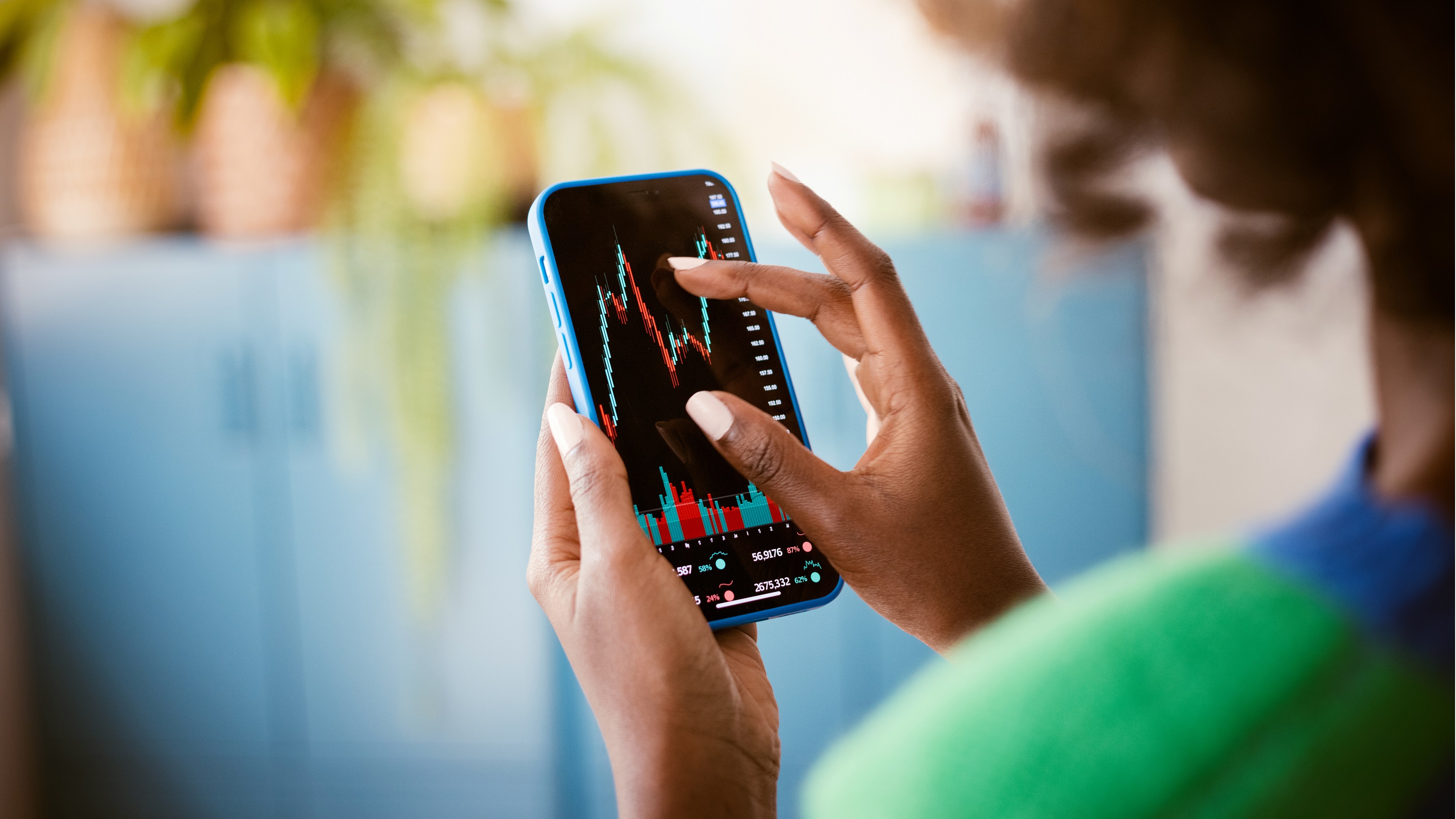Four Ways Your Phone Can Help You Weather Market Volatility
Smartphone apps can help investors make healthy decisions and maintain a disciplined, long-term investment approach — even when emotions try to steer them off course.


Profit and prosper with the best of Kiplinger's advice on investing, taxes, retirement, personal finance and much more. Delivered daily. Enter your email in the box and click Sign Me Up.
You are now subscribed
Your newsletter sign-up was successful
Want to add more newsletters?

Delivered daily
Kiplinger Today
Profit and prosper with the best of Kiplinger's advice on investing, taxes, retirement, personal finance and much more delivered daily. Smart money moves start here.

Sent five days a week
Kiplinger A Step Ahead
Get practical help to make better financial decisions in your everyday life, from spending to savings on top deals.

Delivered daily
Kiplinger Closing Bell
Get today's biggest financial and investing headlines delivered to your inbox every day the U.S. stock market is open.

Sent twice a week
Kiplinger Adviser Intel
Financial pros across the country share best practices and fresh tactics to preserve and grow your wealth.

Delivered weekly
Kiplinger Tax Tips
Trim your federal and state tax bills with practical tax-planning and tax-cutting strategies.

Sent twice a week
Kiplinger Retirement Tips
Your twice-a-week guide to planning and enjoying a financially secure and richly rewarding retirement

Sent bimonthly.
Kiplinger Adviser Angle
Insights for advisers, wealth managers and other financial professionals.

Sent twice a week
Kiplinger Investing Weekly
Your twice-a-week roundup of promising stocks, funds, companies and industries you should consider, ones you should avoid, and why.

Sent weekly for six weeks
Kiplinger Invest for Retirement
Your step-by-step six-part series on how to invest for retirement, from devising a successful strategy to exactly which investments to choose.
In this fast-paced digital era, your smartphone is likely always close by, serving as a gateway to your investment account(s). While easy access to your portfolio has its advantages, it can also lead to impulsive and potentially damaging investment behavior.
Even the most successful, rational investors sometimes experience feelings of anxiety when they encounter market volatility like what we’re experiencing these days.
While it can be tempting to make a knee-jerk trading decision when emotions are high, well-designed mobile investment applications offer features that inspire healthier investment choices that support a long-term, stay-the-course strategy aligned with your goals and risk tolerance.
From just $107.88 $24.99 for Kiplinger Personal Finance
Become a smarter, better informed investor. Subscribe from just $107.88 $24.99, plus get up to 4 Special Issues

Sign up for Kiplinger’s Free Newsletters
Profit and prosper with the best of expert advice on investing, taxes, retirement, personal finance and more - straight to your e-mail.
Profit and prosper with the best of expert advice - straight to your e-mail.
Here are four ways that digital tools and features can help balance emotion and logic in your investment decisions:
No. 1: Portfolio reviews over time
While staying the course is generally the best all-weather approach, emotions can undoubtedly influence your investment approach. Emotions like optimism for your family's future or pride in your accomplishments can propel you to invest in the first place.
When the market turns in your favor, it can fill you with confidence. But when it goes down, it can prompt unhealthy and potentially damaging reactions.
Many investment apps allow investors to look back at their portfolio’s performance over periods of time — often helping to show that avoiding an impulsive reaction to market volatility has been a long-term net-positive for their performance.
This can offer valuable perspective for investors, helping to reframe emotions and reinforce the benefits of adhering to a well-planned investment strategy.
This is consistent with Vanguard's goals-based investment philosophy, which advocates for maintaining long-term discipline and diversification.
However, this does not necessarily ensure a profit or protect against loss, as all investing is subject to risk. That’s why we offer Portfolio Watch, a tool in our mobile app that helps you understand your portfolio composition and mix at a granular level by comparing it with a target portfolio, using historical data, to show how a hypothetical portfolio would’ve performed over time.
By reflecting on how portfolios performed during previous periods, investors can see the benefits of their disciplined approach and reinforce their commitment to their long-term goals. Just keep in mind that past performance is not a guarantee of future returns.
No. 2: Digital thought leadership libraries
Many investment apps serve not just as a tool for reviewing your portfolio but as a portal to a comprehensive digital library.
This repository could include insights on retirement planning, portfolio optimization and the fundamentals of investing, presented through articles, videos and tutorials.
When your emotions are high, you may be well served to take time to pause and reevaluate your thinking.
Often, well-targeted and relevant thought leadership and insights can help contextualize what’s going on in the market and provide critical perspective to balance out emotional drivers.
These resources typically include historical market trends, investment strategy tools and reminders about the importance of maintaining your approach.
By staying informed and grounded, you can make more confident and strategic decisions about your portfolio.
No. 3: Digital alerts
Investors can benefit from tools that keep them focused and enable timely decisions. Digital alerts can help investors by providing real-time notifications of important market trends in a way that encourages thoughtful consideration and accountability, reducing the effects of emotion.
For example, Vanguard shares a notification in our mobile app that links to trading best practices, like using order types, when volatility reaches high levels.
Paying attention to messages like these can help you maintain control over your investments and reduce the impact of emotional decision-making during a period of volatility.
No. 4: Personalized guidance
Sometimes navigating volatility requires real-time decision-making and planning in advance. Instead of feeling inclined to sell or drastically change your portfolio when the market ebbs and flows, review your broader financial plan, check your portfolio diversification and risk tolerance, and identify any steps you might be missing to fulfill your goals.
Your smartphone can help, as many investment providers offer proactive nudges to help you take actionable next steps toward meeting your investment goals.
Sometimes emotion gets in the way, and proactive messages can remind investors that they have a goal — for example, they want to save for retirement or prepare for their child’s education expenses. Interventions include SMS notifications to not miss the IRA contribution deadline or to alert you to a new 529 account savings opportunity.
Such “to-dos” can help you refocus on the rational reasons for the decisions and minimize the emotional impact by helping you take your next best action.
By staying focused on your long-term objectives and leveraging these tools, you can make healthier moves in your portfolio.
Staying the course
Successfully navigating the market requires consistency and focusing on long-term goals. While it may be tempting to overhaul your investment strategy in response to your emotions, such drastic changes often lead to poor outcomes.
Instead, relying on a well-considered investment plan, available mobile app features and strategies that balance emotion and logic will help you make decisions that align with your long-term objectives.
Related Content
- Stick to the Plan: Don't Panic During Economic Uncertainty
- Three Keys to Logical Investing When Markets Are Volatile
- Market Volatility Tempting You to Get Out? Read This First
- During Market Volatility, Avoid These Common Investing Pitfalls
- Four Historical Patterns in the Markets for Investors to Know
Profit and prosper with the best of Kiplinger's advice on investing, taxes, retirement, personal finance and much more. Delivered daily. Enter your email in the box and click Sign Me Up.

Marco De Freitas is principal and head of Client Experience & Digital for Vanguard Personal Investor. De Freitas leads Personal Investor's CX strategy and its efforts to reimagine end-to-end client journeys across channels. His cross-functional teams of product managers, UX/design, analytics and software engineers are focused on transforming Vanguard's client experience, improving client loyalty and driving better financial outcomes for Vanguard clients. He holds Series 7, 24, 63 and 66 licenses.
-
 Dow Adds 1,206 Points to Top 50,000: Stock Market Today
Dow Adds 1,206 Points to Top 50,000: Stock Market TodayThe S&P 500 and Nasdaq also had strong finishes to a volatile week, with beaten-down tech stocks outperforming.
-
 Ask the Tax Editor: Federal Income Tax Deductions
Ask the Tax Editor: Federal Income Tax DeductionsAsk the Editor In this week's Ask the Editor Q&A, Joy Taylor answers questions on federal income tax deductions
-
 States With No-Fault Car Insurance Laws (and How No-Fault Car Insurance Works)
States With No-Fault Car Insurance Laws (and How No-Fault Car Insurance Works)A breakdown of the confusing rules around no-fault car insurance in every state where it exists.
-
 Dow Adds 1,206 Points to Top 50,000: Stock Market Today
Dow Adds 1,206 Points to Top 50,000: Stock Market TodayThe S&P 500 and Nasdaq also had strong finishes to a volatile week, with beaten-down tech stocks outperforming.
-
 The Best Precious Metals ETFs to Buy in 2026
The Best Precious Metals ETFs to Buy in 2026Precious metals ETFs provide a hedge against monetary debasement and exposure to industrial-related tailwinds from emerging markets.
-
 For the 2% Club, the Guardrails Approach and the 4% Rule Do Not Work: Here's What Works Instead
For the 2% Club, the Guardrails Approach and the 4% Rule Do Not Work: Here's What Works InsteadFor retirees with a pension, traditional withdrawal rules could be too restrictive. You need a tailored income plan that is much more flexible and realistic.
-
 Retiring Next Year? Now Is the Time to Start Designing What Your Retirement Will Look Like
Retiring Next Year? Now Is the Time to Start Designing What Your Retirement Will Look LikeThis is when you should be shifting your focus from growing your portfolio to designing an income and tax strategy that aligns your resources with your purpose.
-
 I'm a Financial Planner: This Layered Approach for Your Retirement Money Can Help Lower Your Stress
I'm a Financial Planner: This Layered Approach for Your Retirement Money Can Help Lower Your StressTo be confident about retirement, consider building a safety net by dividing assets into distinct layers and establishing a regular review process. Here's how.
-
 Stocks Sink With Alphabet, Bitcoin: Stock Market Today
Stocks Sink With Alphabet, Bitcoin: Stock Market TodayA dismal round of jobs data did little to lift sentiment on Thursday.
-
 The 4 Estate Planning Documents Every High-Net-Worth Family Needs (Not Just a Will)
The 4 Estate Planning Documents Every High-Net-Worth Family Needs (Not Just a Will)The key to successful estate planning for HNW families isn't just drafting these four documents, but ensuring they're current and immediately accessible.
-
 Love and Legacy: What Couples Rarely Talk About (But Should)
Love and Legacy: What Couples Rarely Talk About (But Should)Couples who talk openly about finances, including estate planning, are more likely to head into retirement joyfully. How can you get the conversation going?